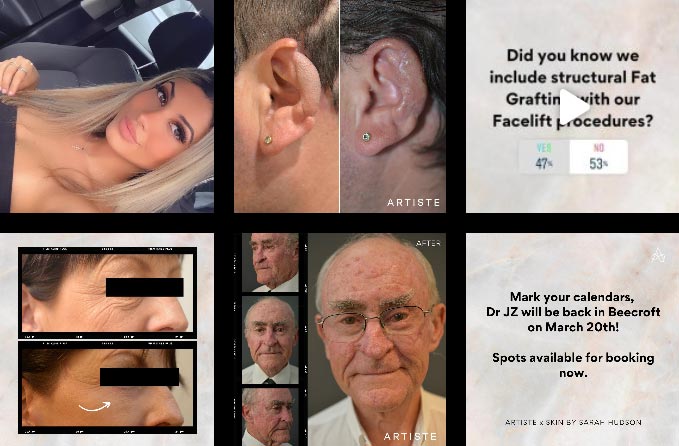Potential Mistakes To Avoid When Considering A Facelift
Model featured in photography
When considering a facelift, it’s important to approach the process with informed decisions and realistic expectations. While everyone learns from their experiences, being proactive and well-prepared can help you navigate the process more effectively. Many factors can influence the outcome of a facelift, and being aware of these considerations helps you to play an active role in planning your care.
In this blog, we share general information on the common mistakes to avoid when considering facelift options.
Misstep 1: Not Researching Your Practitioner Thoroughly
When considering any cosmetic procedure, it is essential to take the time to research the qualifications, experience, and professional accreditation of potential practitioners. Choosing a practitioner without reviewing their credentials and history of care is a common oversight. Look for information about their training and registration with relevant regulatory bodies. Consulting with a qualified and experienced professional is key to addressing your concerns and exploring your options.
Misstep 2: Not Understanding the Key Considerations
When exploring facelift procedures or other significant cosmetic options, understanding the core considerations, such as risks, realistic expectations, and recovery, is essential. Open communication with a qualified practitioner can help you make well-informed decisions.
- Risks: Any cosmetic procedure comes with potential risks. Discuss these thoroughly with your practitioner to understand what might apply to your individual situation and what steps can be taken to mitigate them.
- Realistic Expectations: Outcomes vary depending on individual factors. Rather than relying on generalised expectations, discuss your goals during a consultation to gain a clear understanding of what might be realistic for you.
- Recovery: Be prepared for a recovery period following any major procedure. Understanding the typical stages of recovery and knowing when to seek advice if you have concerns is an important part of the process.
For tailored guidance, it’s best to consult a registered professional who can provide personalised information based on your unique needs and circumstances.
Misstep 3: Prioritising Cost Over Quality
When considering a cosmetic procedure, it may be tempting to prioritise affordability. However, making decisions based solely on cost can lead to unintended challenges. It’s important to ensure that the practitioner you choose has the necessary qualifications, experience, and access to accredited facilities to prioritise your care and safety.
Rather than focusing on bargains, consider the value of professional expertise and the importance of a supportive and well-equipped environment. Discuss your concerns and budget with a qualified practitioner during a consultation to explore options that align with your priorities and needs.
Always prioritise your health and safety when making decisions about cosmetic procedures.
Personalised Guidance on Cosmetic Procedures
For tailored advice on facelift options, consider consulting with a Specialist Plastic Surgeon. During a consultation, you can discuss your goals and gain a comprehensive understanding of the procedure, including the factors to consider and what to expect.
Dr Zoumaras is a board-certified plastic surgeon with extensive experience in facial cosmetic procedures. To explore your options and receive professional guidance, you may book a consultation with Dr. Jack Zoumaras today.
Disclaimer: At Artiste Plastic Surgery, our Plastic Surgeons led by Dr Jack Zoumaras have been trained to the highest possible degree. All surgery has risks and it is always advised to get a second opinion. Risks are very real and we cannot guarantee any result. Results are illustrated as a guide only. All risks are managed and any need for revision surgery or complications (1-5%) can be managed by our specialist plastic surgeons.
Any statements on how you will feel is based on Level V Evidence:
Level V: How you will feel after plastic surgery varies between individuals, depending on psychological and physical factors. Our internal research is based on how patients in our practice feel after surgery.
The blogs are not a substitute for a medical consultation and do not form as part of the doctor to patient relationship.
SHARE THIS ARTICLE
Sep25
Rhinoplasty Recovery Timeline: What to Expect Week by Week
Disclaimer: At Artiste Plastic Surgery, our Plastic Surgeons led by Dr Jack Zoumaras have been trained to the highest possible degree. All surgery has risks and it is always advised ...
Sep25
Are Non-Surgical Nose Jobs Worth It?
Are Non-Surgical Nose Jobs Worth it? Pros, Cons & Alternatives Are Non-Surgical Nose Jobs Worth it? Pros, Cons & Alternatives Are Non-Surgical Nose Jobs Worth it? Pros, Cons & Alternatives ...
ABOUT ARTISTE
Artiste Plastic Surgery is an Award Winning Specialist Plastic Surgery practice led by internationally trained Dr. Jack Zoumaras, Plastic Surgeon and Peer Reviewed Face Surgeon
Artiste offers the latest Cosmetic Surgical Procedures of the Face, Breast and Body, inspired from leading centres around the world.
STAY IN THE LOOP
Enter your email address below to receive updates on new articles and VIP access to promotions and special offers.
FOLLOW US ON INSTAGRAM
